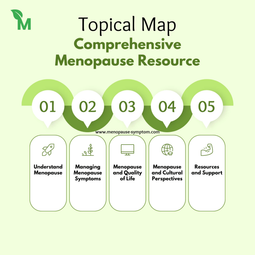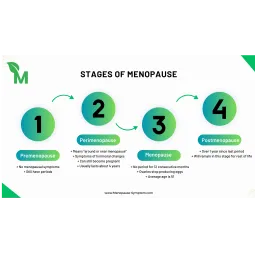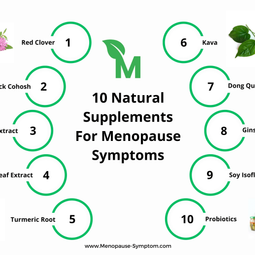What Causes Menopause Belly Fat?
On
25/10/2024Reading time:
3 min
Summary:
Wondering why you're gaining weight around your midsection during menopause? Our informative article explores the hormonal changes and lifestyle factors that contribute to menopause belly fat. Understand the root causes and discover effective strategies to manage your weight and improve your overall health.
Understanding and Tackling Menopause Belly Fat: A Comprehensive Guide
The Menopause Transition: More Than Just Hot Flashes
Menopause is a significant milestone in a woman's life, marking the end of her reproductive years. While hot flashes and mood swings often take center stage, there's another common yet less discussed symptom: the dreaded menopause belly fat. If you've noticed a stubborn pouch around your midsection that seems resistant to diet and exercise, you're not alone. Let's dive into the causes of this frustrating phenomenon and explore effective solutions, including supplements for menopause belly fat.
The Science Behind Menopause Belly Fat
Hormonal Havoc
During menopause, your body undergoes a dramatic shift in hormone levels. Estrogen, which plays a crucial role in fat distribution, begins to decline. This hormonal change can lead to:
Increased insulin resistance
Slower metabolism
Changes in fat storage patterns
As a result, your body tends to store more fat around the abdominal area, leading to that infamous menopause belly.
Stress and Cortisol: The Hidden Culprits
Menopause can be a stressful time, both physically and emotionally. When stress levels rise, so does the production of cortisol, often called the "stress hormone." Elevated cortisol levels can contribute to:
Increased appetite, especially for high-calorie foods
Fat storage in the abdominal area
Difficulty losing weight, even with diet and exercise
Understanding this connection between stress and belly fat is crucial for developing effective strategies to combat it.
Lifestyle Factors That Contribute to Menopause Belly Fat
While hormonal changes play a significant role, lifestyle factors can exacerbate the problem. Some common contributors include:
Sedentary lifestyle
Poor diet choices
Inadequate sleep
Excessive alcohol consumption
Addressing these factors can make a significant difference in managing menopause belly fat.
Effective Strategies to Combat Menopause Belly Fat
The Power of Nutrition
A balanced diet is crucial in managing menopause symptoms, including belly fat. Focus on:
Lean proteins to support muscle mass
Fiber-rich foods for better digestion and satiety
Healthy fats like omega-3s for hormone balance
Phytoestrogen-rich foods like soy and flaxseeds
"Let food be thy medicine and medicine be thy food." - Hippocrates
Exercise: Your Secret Weapon
Regular physical activity is essential for maintaining a healthy weight and reducing belly fat. Incorporate:
Strength training to boost metabolism
Cardiovascular exercises for overall fat burning
Yoga or Pilates for stress reduction and core strengthening
Stress Management Techniques
Reducing stress can have a profound impact on your waistline. Try:
Meditation or mindfulness practices
Deep breathing exercises
Regular self-care routines
Supplements for Menopause Belly Fat: A Promising Solution
While lifestyle changes are fundamental, supplements can provide additional support in managing menopause belly fat. Here are some evidence-based options:
1. Omega-3 Fatty Acids
These essential fats can help:
Reduce inflammation
Support hormone balance
Improve insulin sensitivity
Consider adding a high-quality fish oil supplement to your daily routine.
2. Probiotics
A healthy gut microbiome is crucial for weight management. Probiotic supplements can:
Improve digestion
Reduce bloating
Support a healthy metabolism
Look for a multi-strain probiotic with at least 10 billion CFUs per serving.
3. Vitamin D
Many women become deficient in vitamin D during menopause. Supplementation can:
Support bone health
Improve mood
Potentially aid in weight management
A daily dose of 1000-2000 IU is generally recommended, but consult your healthcare provider for personalized advice.
4. Magnesium
This mineral plays a crucial role in:
Regulating blood sugar
Supporting sleep quality
Reducing stress
Consider a magnesium glycinate supplement for optimal absorption.
5. Adaptogenic Herbs
Herbs like ashwagandha and rhodiola can:
Help manage stress
Support adrenal function
Potentially aid in weight management
Always choose high-quality, standardized herbal supplements from reputable sources.
The Importance of Personalized Approach
While these supplements for menopause belly fat can be beneficial, it's essential to remember that every woman's body is unique. What works for one person may not work for another. It's crucial to:
Consult with a healthcare professional before starting any new supplement regimen
Pay attention to how your body responds to different supplements
Be patient and consistent in your approach
Embracing the Journey: Beyond the Battle with Belly Fat
As we conclude our exploration of menopause belly fat and potential solutions, it's important to step back and look at the bigger picture. Menopause is a natural transition, and while the physical changes can be challenging, they also mark a new chapter in your life.
Remember:
Your worth is not defined by your waistline
Focus on overall health and well-being, not just weight loss
Celebrate your body for all it has accomplished
By combining a healthy lifestyle, stress management techniques, and carefully chosen supplements for menopause belly fat, you can navigate this transition with grace and confidence. Embrace the journey, and remember that you have the power to feel your best at any age.
Source: Team MPS compiled, analyzed and wrote. Please dont reup without source of us. Many thanks.




